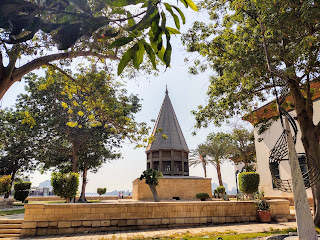 |
| The Nilometer |
Descend down the steps of the Nilometer, and you're penetrating layers of history. As the name suggests, the Nilometer was used to measure the floodwaters of the river. Now, no longer in use, it is the oldest monument in Cairo that survives in its original form. Carefully, gingerly, I place my feet on the worn stone of this architectural marvel. I reach the base, and gaze into the flood gates, now empty and dry, no longer functional. But just a few years ago, they determined seasonal changes, water levels, harvest predictions and tax amounts. That's almost everything that affected the lives of ancient Egyptians - water, food, money and the weather.
 |
| The Architect - notice the compass in his hand |
 |
| The marvelous graduated Corinthian column |
Designed by Abu’l ‘Abbas Ahmad ibn Muhammad
ibn Kathir al-Farqhani, a native of Farghana, West Turkestan, the Nilometer is an elegant combination of art and science. As in any Islamic structure, there is an abundance of geometrical and florid designs. It dates back to 861AD, fairly recent, considering Egypt's 6000 year old documented history. The conical ceiling is alive with floral symmetrical designs, the wooden rails exquisitely carved. My guide book tells me, the Quranic inscriptions with the Kufic script are verses about rain, crops and abundance. But it's the towering Corinthian column with the curled acanthus leaves that has pride of place. The column is marked like a ruler to measure the height of the water. The guide books explains that it measures 16 cubits, which are 54 centimeters each.
 |
| Descending into the stone pit |
 |
| Ceiling of the Nilometer |
Although there was a guide at the Nilometer, he explained everything in Arabic. An Egyptian tourist noticing my lack of comprehension, came up to me later and offered an explanation in English. She said - the kings used the Nilometer not just to measure the floodwaters, but to predict the amount of taxes to be levied for the year. Too much or too little water indicated a bad harvest, therefore lower taxes. Just enough water meant, the harvest would be good, so the taxes would be high. Thus the Nilometer was a measure for taxes too!
A word here about the kindness of strangers...Egyptians just have to notice my confusion, and they step in to help. Whether it is the tourist who gives me an extra explanation in English, the taxi driver who refuses payment when he transports me to a nearby destination, the doorman who runs to open the elevator door when he sees me carrying groceries, Egyptians are kind and friendly.
Massalama, until next time!
 |
| A floral detail in the carved in stone |
 |
| The base of the column |










Thanks for the tour. I had no idea such a thing existed. Oh those clever Egyptians, thousands of years ago. And we can’t figure out how to keep our roads from getting potholes each winter..
ReplyDeleteAngeline, it is truly an amazing structure! I love when art, science, economics and history is mixed together with a good dollop of history and culture!
ReplyDeleteI love that you shared a bit of history along with your connection to the community. I am sure you are still adjusting to your new location, but it sounds like the warmth of the locals is making that adjustment a lot easier. Be well dear friend.
ReplyDeleteI wrote the last reply. XO
DeleteMy name is not showing up... It's Sheila. :)
DeleteThank you Sheila! Miss you, my traveling teacher friend! Hope you are doing well!
DeleteWhat an amazing blog! Lovely history, your own impresions, great photos. Loved it and hope to continue to read your fine writing about Egypt! Cathy K.
ReplyDeleteThank you Cathy! Will keep writing and keep you updated.
DeleteLovely Nats! Back in the day, when we were little more than puppies, who would've thought that one day you'd be exploring the beauties of Egypt and sharing it with us back home?? C'est la vie...
ReplyDeleteThanks PK! It must be that recitation of Ozymandias that stayed with me through the years!
DeleteWow! I too love when architecture, science, politics, religion, and even economics are working together to support a community. Those Ancient Egyptians were amazing and have many gifts to offer the "modern" society. =-) So happy to hear people are kind and that you are enjoying your time. I look forward to the next post!
ReplyDeleteGreat stuff--very interesting information! Thank you Natasha!
ReplyDelete